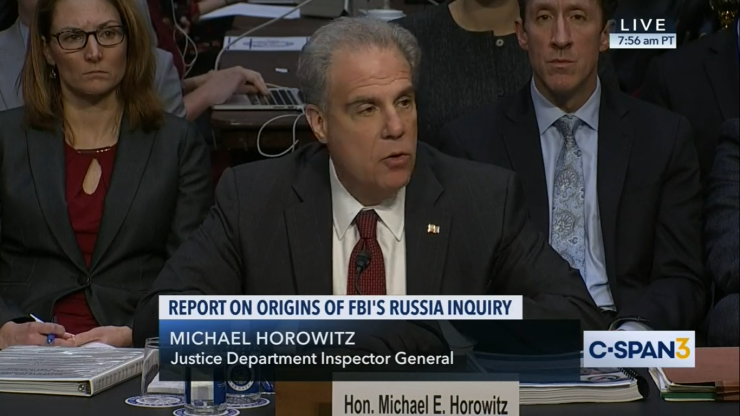This Isn’t The First Time The IG Denied Flagrant Bias At The FBI
By I&I Editorial
InssuesInsights.com

Democrats and the mainstream press – is there any difference between the two these days? – have been clinging to the “no bias” statement by the Justice Department inspector general with all their might.
The IG said that he couldn’t state definitively that political bias motivated officials at the FBI to launch and then sustain an investigation against the Trump campaign based on the Clinton-campaign funded and thoroughly discredited Steele Dossier.
That was enough for press to run headlines such as:
“Bias didn’t taint FBI leaders running Trump-Russia Investigation”
“Report on F.B.I. Debunks Anti-Trump Plot”
“Mistakes, but no political bias in FBI probe of Trump campaign: watchdog”
And when Inspector General Michael Horowitz testified before the Senate Judiciary Committee on Wednesday, Democrats repeatedly pressed him to state his “no bias” claim over and over.
“You didn’t find a ‘deep state’ conspiracy against candidate or President Trump,” Sen. Diane Feinstein asked in the form of a statement.
“We found no bias,” Horowitz said.
Sen. Patrick Leahy repeated the “question,” saying that the IG had found “no evidence that the investigation was motivated by anti-Trump or political bias.”
The notion that there was “no bias” at all is impossible to believe when you look at the evidence that Horowitz gathered.
First, what the IG report actually said was that it couldn’t find “documentary or testimonial evidence” that anti-Trump animus got the investigation going in the first place, saying it was “a discretionary judgment call left to the FBI.”
Basically, then, the IG is saying there was no memo saying flat out that Trump-hating FBI officials were taking on this investigation to sabotage the Trump candidacy and presidency, and no one would openly admit bias to the IG’s investigators.
However, even the claim that the investigation’s
launch was legitimate and free of bias is itself
being challenged by U.S. Attorney John Durham. He
took the unusual step of publicly disagreeing with
the IG, saying “we do not agree with some of the
report’s conclusions as to predication and how the
FBI case was opened,” making note of the fact that
the IG was limited to talking only to people at
Justice.
In any case, this “no bias” language in the latest IG report is almost identical to what Horowitz said in his June 2018 report about the hopelessly biased FBI “investigation” into Hillary Clinton’s use of a private email server when she was secretary of State.
In that report, the also G claimed that there was “no evidence that the conclusions by department prosecutors were affected by bias.” The report then went on to say that officials made a series of “judgment calls” that were technically proper.
But the truth is that every single one of these judgment calls benefited Clinton.
Plus, the IG found plenty of evidence of flagrant bias among the key players in that investigation, including exchanges between Peter Strzok and Lisa Page about how “we’ll stop” Trump from being elected.
In the Trump case, the evidence of bias is even more compelling because what’s involved weren’t “judgment calls” but clear violations of normal procedures.
“We found,” Horowitz told the Judiciary Committee, “that members of the Crossfire Hurricane team failed to meet the basic obligation to ensure that the Carter Page FISA applications were ‘scrupulously accurate.’”
He went on to say that “we identified significant inaccuracies and omissions in each of the four applications.” (Emphasis added) There were seven such errors in the first FISA application, and 10 more by the final renewal went to the FISA court.
What kind of “inaccuracies and omissions”? Oh, things like hiding from the court information that “raised significant questions about the reliability of the Steele reporting that was used.” And failing to tell the court that Page had been an FBI informant, which involved working with Russian intelligence officers.
“We also found” he went on, “basic, fundamental, and serious errors during the completion of the FBI’s factual accuracy reviews.” And it found that FBI officials “did not give appropriate attention to facts that cut against probable cause.”
In other words, any shreds of evidence that there was no reason to spy on Page.
Horowitz said these “basic and fundamental errors” were made by “three separate, hand-picked investigative teams.”
If the FBI were simply incompetent, you’d expect these “fundamental errors” to be more random. But as with the “judgment calls” during the Clinton email investigation, all of these mistakes just happened to cut in one direction only. In this case of Clinton, they all helped the FBI reach the decision they’d made at the start to exonerate her. In Trump’s case, every supposed screw-up all helped to keep the probe going.
Even Horowitz himself wouldn’t categorically deny that bias played a role in the FISA applications. As he told Sen. Patrick Leahy, the Vermont Democrat, “it gets murkier … when you get to the FISA.”
“Murkier” is one way of putting it. “Deep state, anti-Trump bias” is another way. Just because an inspector general won’t say those words doesn’t mean it didn’t happen.

